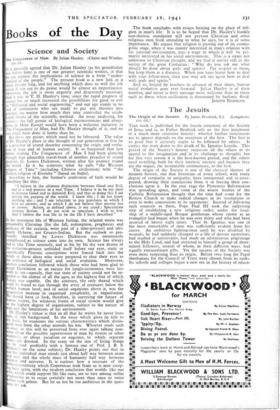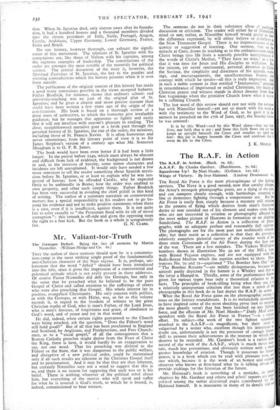The Jesuits
The Origin of the Jesuits. By James Brodrick, S.J. (Longmans. los. 6d.)
THIS book is published for the fourth centenary of the Society of Jesus and is, as Father Brodrick tells us, the first instalment of a much more extensive history : whether further instalments are to appear depends on the reception of the first. The first is so good that it certainly ought to be followed by others. It carries the story down to the death of St. Ignatius Loyola. This period of the Society's history surpasses all the others in its appeal to the imagination and in its challenge to thought; but for this very reason it is the best-known period, and the others need re-telling, both for their intrinsic interest and because they are the sequel, the inseparable commentary, to the first.
The origin of the Society is one of the classical themes of modern history, one that historians of every school, with every degree of sympathy or antipathy, have interpreted and re-inter- preted, drawing their conclusions from it or forcing their con- clusions upon it. In the year 1540 the Protestant Reformation was spreading apace, and some of the wisest leaders of the Catholic Reformation thought that the time had come for the Roma'n Church to make radical changes in its institutions or even to make concessions to its opponents. Instead of following such counsels as these, Pope Paul. III took the sufprising step of establishing a new religious order, under the head- ship of a middle-aged Basque gentleman whose career as an evangelist had begun when he was over thirty and who had been accused of heresy eight times. That St. Ignatius was one of the most remarkable of men was sufficiently evident from his career. An ambitious fighting-man until he was disabled by wounds, he had suddenly changed to a life of devout austerities, had studied at universities, had made an adventurous pilgrimage to the Holy Land, and had attracted to himself a group of deter- mined followers, several of whom, in their different ways, had equally extraordinary gifts. Yet the success of the Society was even more surprising than its origin. Before very long the Papal theologians for the Council of Trent were chosen from its ranks. Its schools and colleges began a new era in the history of educa-
don. When St. Ignatius died, only sixteen years after its founda- tion, it had a hundred houses and a thousand members divided into the eleven provinces of Italy, Sicily, Portugal, Aragon, Castile, Andalusia, Upper Germany, Lower Germany, France, India and Brazil.
No one history, however thorough, can exhaust the signifi- cance of this movement. The relations of St. Ignatius with his companions are, like those of Nelson with his captains, among the supreme examples of leadership. The constitutions of the order are amongst the most notable of the materials for political
science. The central document of the story is, however, the Spiritual Exercises of St. Ignatius, the key to the puzzles and seeming contradictions which the history presents when it is seen from outside.
The publication of the original sources of this history has made a good many corrections possible in the views accepted hitherto. Father Brodrick, for instance, shows that ordinary school- and university-teaching was no part of the original plan of St. Ignatius; and he gives a clearer and more precise account than could have been written a few years ago of the origin of the constitutions. His book is based on a thorough review of a great mass of authorities, to which the footnotes give invaluable guidance; but he manages this apparatus so lightly and easily that it will not interfere with anyone's pleasure in reading. The clear, straightforward narrative goes at a brisk pace through the personal history of St. Ignatius. the rise of the order, the missions, including those of St. Francis Xavier. It is often humorous and never sententious; from the literary point of view it is to Sir James Stephen's version of a century ago what Mr. Somerset Maugham is to G. P. R. James.
The book would have been even better if it had been a little longer. In the period before 1540, which must always be obscure and difficult from lack of evidence, the background is not drawn in and, in the interests of brevity, some minor characters and incidents are left unexplained. It would only have needed a few more sentences to tell the reader something about Spanish mysti- cism before St. Ignatius, or at least to explain why he was sus- pected of heresy; how he offended Carafa; why he expected Ortiz to be unfriendly in Rome; how the order was enabled to own property, and other such simple things. Father Brodrick has been very successful in avoiding the chief pitfall in this kind of writing. The author of a summary narrative on controversial matters has a special responsibility to his readers not to go be- yond his evidence and not to make positive statements when there is a case, even if it is insufficient, against them. It is not quite fair to refer casually to " the Protestant flood with its silt of moral corruption ": this remark is off-side and gives the opposing team the right to a free kick. But the book as a whole is scrupulously



























 Previous page
Previous page